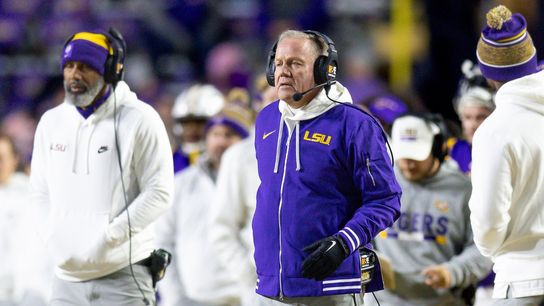Last week, Brian Kelly said something that caught my ear.
In the second practice of Kelly's first spring at LSU, his staff clocked one Tiger at 20 miles per hour. In the same practice of his second spring, they had nine.
"I think we've looked at all of our numbers, and it's pretty clear our football team is bigger, faster, stronger," Kelly said. "Now you've got to be able to translate that as well."
That quote caught a lot of people's ear, including The Athletic's Brody Miller. Miller talked to LSU's director of athletic development Jake Flint who explained that raw speed is just one of numerous metrics that the Tigers' staff tracks.
Among them, per Miller's piece:
... how many hours they slept, how well they slept, their fatigue level, stress level, energy level, and how many meals they ate the day before.
But that's common stuff. Here's another tranche of data LSU collects on its players.
At Kelly’s LSU, the team compiles data on nearly everything, from who is late to meetings to who eats the right amount of meals to who parks in the handicapped spots. Even who keeps a clean locker is tracked, with the equipment staff going through the locker room every day marking each locker clean or dirty. It’s all about who does the right things, and each week Flint and his team get together to comb through the different pieces of information.
“It’s a holistic approach to development,” Flint said. “I haven’t even talked about sets or reps or sprinting, right? It’s doing those things — total preparation, the process, if you want to call it that — that leads into your ability to be on the field and express your physical output.”
Reading the piece, it was clear there's a psychological component to this as well. Call it holistic accountability. For better or worse, LSU has left its players nowhere to hide. If players know their every movement is going to be tracked and catalogued, they're naturally going to give 100 percent each day in the weight room, if for no other reason than the human-nature desire not to be called into Flint's office to explain why they're not giving it 100 percent.
But if Flint, Kelly and the rest of LSU's staff can explain how and why tracking where they park and how they leave their locker translates to the field and, therefore, impacts their chances of an NFL future, then LSU's players are going to want to give it 100 percent each day.
Judging by the numbers, it looks like the message is sinking in.
